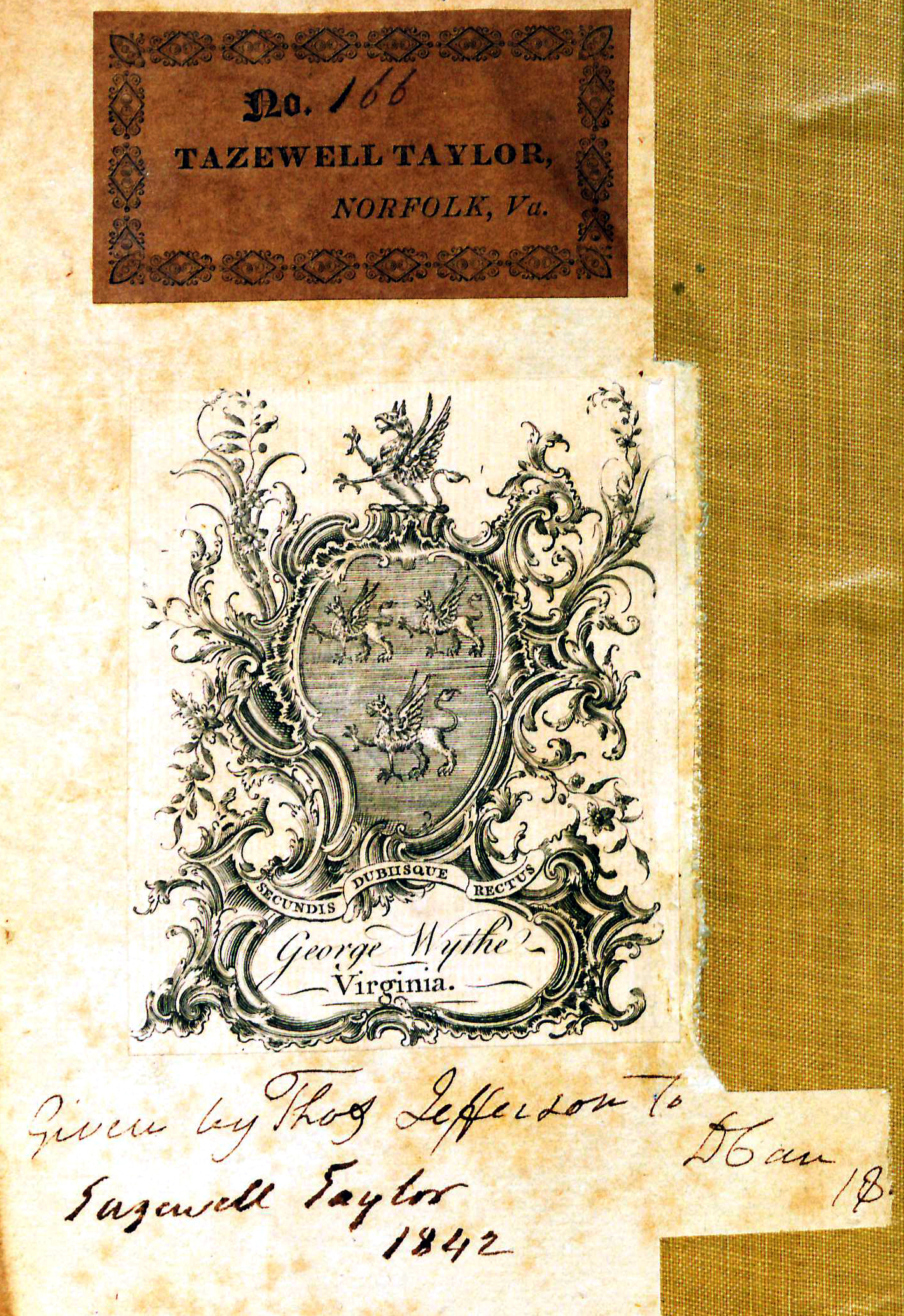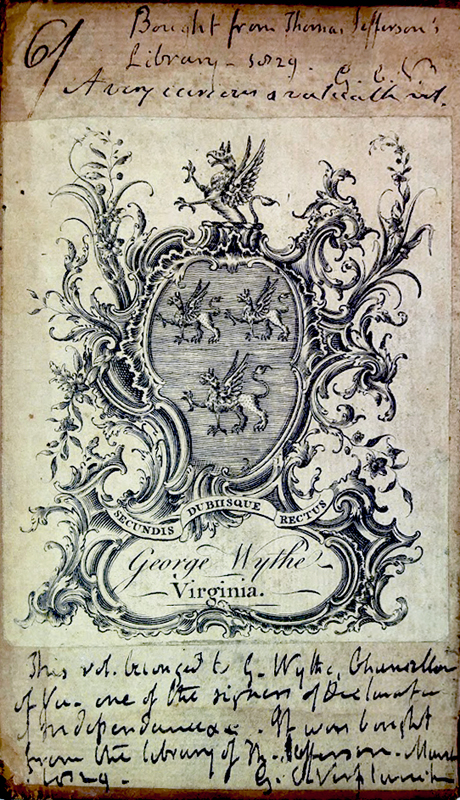George Wythe's bookplate
The Chippendale style, armorial bookplate[1] for George Wythe's personal library features a demi-griffin (a mythical beast with the head and wings of an eagle and the body of a lion) segreant on the crest and three griffins passant on the escutcheon. In heraldry, the griffin denotes strength, intelligence, courage and leadership. A family of Wythes from Suffolk, England, had a coat of arms with three golden griffins on a field of azure blue.[2] Coincidentally, the College of William and Mary chose the griffin as its mascot in 2010.
A metal printer's plate which was probably the matrix for Wythe's bookplates is held by the American Antiquarian Society in Worcester, Massachusetts.[3] It is likely Wythe designed the bookplate himself,[4] having a plate made for him by an engraver, most likely in London. Wythe did order from London, in 1768, an engraved copper plate for the making of bookplates for the library of the House of Burgesses of Virginia:
You will oblige me by sending a copper plate, with the arms of Virginia neatly engraved and some impressions of them to be pasted on the books belonging to the house of burgesses. If any additions are made on the plate in consequence of what is proposed within, I will cheerfully pay the extraordinary cost.[5]
The motto on Wythe's bookplate "Secundis Dubiisque Rectus" translates as "Upright in Prosperity and in Perils."[6] This was also the motto chosen by Sir William Blackstone in 1770, for the commemorative rings given to the King, Lord Chancellor, and close friends and family to mark the occasion when he was called to the Coif: "I was called a Serjeant; the motto on my rings being, Secundis, dubiisque, rectus."[7]
Bookplates
Wythe's bookplate in volume 6 of The Reports of Sir Edward Coke (1738), George Wythe Collection, The Wolf Law Library, College of William & Mary, Williamsburg, Virginia.
Wythe's bookplate from volume 7 of The Reports of Sir Edward Coke (1738), Special Collections, Earl Gregg Swem Library, College of William & Mary, Williamsburg, Virginia.
Wythe's bookplate in P. Virgilii Maronis Bucolica, Georgica, et Aeneis (1743), Mount Gulian Historic Site, Beacon, New York.
Known surviving volumes with Wythe's bookplate
- Main article: Known Surviving Wythe Volumes
There are twenty-four known volumes containing Wythe's bookplate which have survived to the present day:
- Andrews, George. Reports of Cases Argued and Adjudged in the Courts of King's Bench, in the Eleventh and Twelfth Years of the Reign of His Present Majesty King George the Second. London, In the Savoy: 1754. Library of Congress.
- Bacon, Matthew, Joseph Sayer, and Owen Ruffhead. A New Abridgment of the Law. 3rd ed. London, In the Savoy: 1736-66. [Volume II has Wythe's bookplate; volume IV has Wythe's name inscribed.] Library of Congress.
- Brownlow, Richard. Brownlow Latinè Redivivus: a Book of Entries: of Such Declarations, Informations, Pleas in Barr and Abatement, Replications, Rejoynders, Issues, Verdicts, Bills of Exception to Verdicts, Judgments, Demurrers, and Other Parts of Pleadings, (Now in Use) in Personal and Mixt Actions: Contained in the First and Second Parts of the Declarations and Pleadings of Richard Brownlow. London: Printed by the assigns of Richard and Edward Atkyns ... and are to be sold by S. Heyrick ... T. and G. Sawbridge ... and M. Gillyflower, 1693. Library of Congress.
- Brydall, John. Ars Transferendi Dominium, the Second Part. Or, A Sure Law-Guide to the Conveyancer Consisting of Many Observations and Various Questions, with Their Resolutions, Relating to Feoffments, Grants, Fines, Common Recoveries, Exchanges, Releases, Confirmations, Attornments, Surrenders, Bargains and Sales, and Devises. London: Printed by the assigns of R. and E. Atkyns ... for Samuel Heyrick ... and Isaac Cleave, 1698. Library of Congress.
- Coke, Edward. The Reports of Sir Edward Coke, kt. In English, in Thirteen Parts Compleat; (With References to All the Ancient and Modern Books of the Law.). London: In the Savoy, Printed by E. and R. Nutt, and R. Gosling, for R. Gosling, 1738. [Volume IV. Also inscribed on inside of front board: "Given by Thos. Jefferson to D. Carr, 1806."] Private collection.
- Coke, Edward. The Reports of Sir Edward Coke, kt. In English, in Thirteen Parts Compleat; (With References to All the Ancient and Modern Books of the Law.). London: In the Savoy, Printed by E. and R. Nutt, and R. Gosling, for R. Gosling, 1738. [Volumes VI and VII only. Also inscribed on inside of front board: "Given by Thos. Jefferson to D. Carr, 1806."] College of William & Mary.
- Croke, George, Sir. The First[-Third] Part of The Reports of Sr George Croke Kt.: Late One of the Justices of the Court of Kings-Bench, and Formerly One of the Justices of the Court of Common-Bench; of Such Select Cases as were Adjudged in the Said Courts. London: Printed by W. Rawlins, S. Roycroft, and H. Sawbridge, assigns of Richard and Edward Atkins, Esquires; and are to be sold by H. Twyford ... [et al.], 1683. Library of Congress.
- Gilbert, Geoffrey, Sir. Reports of Cases in Equity, Argued and Decreed in the Courts of Chancery and Exchequer, Chiefly in the Reign of King George I. By a Late Learned Judge. To Which are Added Some Select Cases in Equity, Heard and Determined in the Court of Exchequer in Ireland. London: In the Savoy, Printed by H. Lintot for D. Browne, J. Shuckburgh, 1742. 2nd ed. [Also inscribed on inside of front board: "Given by Thos. Jefferson to D. Carr, 1806."] University of Virginia, Albert and Shirley Small Special Collections Library.
- Hale, Matthew, Sir. Historia Placitorum Coronæ. The History of the Pleas of the Crown. 2 vols. London: Printed by E. and R. Nutt, and R. Gosling for F. Gyles ... [et al.], 1736. [Also inscribed on inside of front board of volume one: "Given by Thos. Jefferson to D. Carr, 1806."] University of Virginia, Albert and Shirley Small Special Collections Library.
- The Holy Bible, Containing the Old and New Testaments. Oxford: Thomas Baskett, 1754. [Includes manuscript note, "The Bible belonged to George Wythe, bequeathed by him to Thomas Jefferson, given by Thomas Jefferson to his grand-daughter Cornelia Jefferson Randolph, bequeathed by her to her niece Martha Jefferson Trist, given by her to her son, Nicholas Philip Trist Burke, Alexandria, Va., after his death given to the University of Virginia by Martha Jefferson Burke, Alexandria, Va., July 4, 1912."] University of Virginia, Albert and Shirley Small Special Collections Library.
- Homer. The Iliad of Homer. Translated by Alexander Pope Esq. London: Printed for Henry Lintot, 1750. [Bookplate, signatures of Ellen Wayles Randolph and, George Wythe Randolph.] Monticello Foundation, Jefferson Library.
- Homer. Homeri Ilias, Græce et Latine. Annotationes in Usum Serenissimi Principis Guilelmi Augusti, Ducis de Cumberland. Edited by Samuel Clarke. 3rd edition. Londini: 1740. [Bookplate in volume I only.] University of Virginia, Albert and Shirley Small Special Collections Library.
- Homer. Ομηρου Οδυσσεια. Homeri Odyssea Græca. Oxonii: 1750. College of William & Mary. Colonial Williamsburg Foundation, John D. Rockefeller, Jr. Library.
- Jones, Sir William. Les Reports de Sir William Jones, chevalier, Jades un Des Justices del' Banck le Roy, et Devant un des Justices del' Court de Common-Banck et Devant Capital Justice d'Ireland de Divers Special Cases cy Bien in le Court de Banck le Roy, come le Common-Banck in Angleterre: cy Bien en le Darreign Temps del' Reign de Roy Jaques, come en l'Anns de Roy Charles I: Queux Fueront Adjudge en les Dits Courts en le Temps en que il Fuit Judge en Ceux. London: Printed by T.R. and N.T. for Thomas Basset and Richard Chiswel, 1675. Virginia Historical Society.
- The Law of Actions on the Case for Torts and Wrongs: Being a Methodical Collection of All the Cases Concerning Such Actions ... to Which are Added, Several Select Precedents of Declarations and Pleas in Such Actions, and References to All that are Extant in the Books of Entries. London: Printed for Thomas Trye, 1741. Library of Congress.
- Levinz, Creswell, Sir. Les Reports de Sr. Creswell Levinz: Jades un del Justices del Common Bank, en Trois Parts: Commencant en le 12 an de Roy Charles II. & fini en le 8 an de son Majesty William III. London: Printed by the assigns of Richard and Edward Atkins esq; for S. Keble ... D. Browne ... T. Benskin ... and J. Walthoe ..., 1702. Library of Congress.
- Pigott, Nathaniel. New Precedents in Conveyancing: Containing Great Variety of Curious Draughts, Many of Them on Special Occations, Drawn or Settled by Mr. Piggot, Northey, Webb, and Other Eminent Hands; and Now Publish'd from Original Manuscripts. London: Printed by H. Lintot for J. Worrall, 1742. Library of Congress.
- Rastell, William. A Collection of Entries of Declarations, Barres, Replications, Rejoynders, Issues, Verdicts, Judgements, Executions, Proces, Continuances, Essoynes, and Divers Other Matters Newly Amended and Much Enlarged with Many Good Presidents of Later Time, Whereof Divers are upon Sundry Statutes, and Noted in the End of the Table: the New Presidents throughout the Book, and likewise their Titles in the Table, have this Mark [fingerpost] set before Them: by the Authors Epistle, and Directions Therein, .... London: Printed by John Streater, James Flesher, and Henry Twyford, assigns of Richard Atkins and Edward Atkins ... and are to be sold by George Sawbridge, 1670. Colonial Williamsburg Foundation, John D. Rockefeller, Jr. Library.
- Vernon, Thomas. Cases Argued and Adjudged in the High Court of Chancery: Published from the Manuscripts of Thomas Vernon ... by order of the High Court of Chancery. London: Printed by E. and R. Nutt and R. Gosling (assigns of E. Sayer) for J. Tonson, 1726. Library of Congress.
- Viner, Charles. A General Abridgement of Law and Equity, Alphabetically Digested under Proper Titles, with Notes and References to the Whole. Aldershot: The author, 1742. Library of Congress.
- Virgil. P. Virgilii Maronis Bucolica, Georgica, et Aeneis. Ex recensione Alexandri Cuningamii Scoti. Edinburgi: Apud G. Hamilton & J. Balfour, 1743. Mount Gulian Historic Site, Beacon, New York.
References
- ↑ Charles Dexter Allen, American Book-plates: A Guide to Their Study with Examples (New York: Macmillan, 1905).
- ↑ W.J. Corbett and T. Tindal Methold, "The Rise and Devolution of the Manors in Hepworth, Suffolk," Proceedings of the Suffolk Institute of Archaeology and Natural History X (1900), 135.
- ↑ American Antiquarian Society, "Bookplate of George Wythe, Virginia. Metal plate on wood. 8.5 x 7.5 cm.," Box 22 Bookplates, etc., AAS related Matrices: Proceedings, etc., BIB 523518.
- ↑ Alonso Thomas Dill, George Wythe: Teacher of Liberty (Williamsburg, Virginia: Virginia Independence Bicentennial Commission, 1979), 3.
- ↑ "George Wythe Letter to John Norton dated August 18, 1768," Colonial Williamsburg Foundation, Rockefeller Library Special Collections, SCMS1936.3-0118.
- ↑ Dill, 3.
- ↑ Reports of Cases Determined in the Several Courts of Westminster-Hall, from 1746 to 1779 (London: S. Sweet, et al., 2nd ed., 1828), 681.



